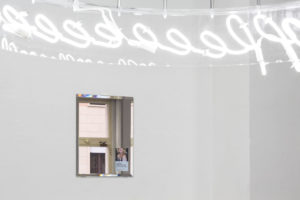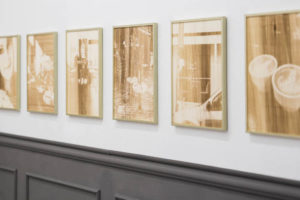Débora Delmar (b. 1986, Mexico City) uses the iconography of commercial stereotypes to address the issue of class mobility and self-representation. Her work focuses on exploring the global consumption culture of the 21st century and often takes as a paradigm food as an object of luxury to analyze the marketing and economic structures through which consumers’ (induced) habits strengthen their social conscience. In the exhibition Stressed, Blessed and Coffee Obsessed at GALLLERIAPIÙ the artist examines the influence of Western culture of coffee in the development of cities, in social relations and in the contemporary lifestyle through an environmental setting that transforms the gallery into a hybrid space between a trap and a non-place. Franchising coffee chains, emblematic products of the surmodernity, in the most economically developed countries have replaced the aggregative function of the historical Cafés, once meeting places frequented by artists and intellectuals. They are environments with an accurate and homologating design where nothing is left to chance: the number of decibels, the lux, the organization of the paths, the distribution of the spaces, the technological comforts (wi-fi, automatic doors, lighting and water) and the type of information is calculated accurately so that the individual within them anesthetizes his personal characteristics to continue to exist exclusively as a client. The only role aloowed is that of the user, subject to a few simple rules, such as waiting for his turn, follow the instructions, consume the product and pay. In spite of this homogenization, coffee franchises usually are not perceived as boring but assume in the imagination of the average user the positive character of status symbol, emblem of hipster culture or professional success. In this way the “cultural cleaning” of the corporations involved in the globalized business passes from the aesthetics of the places – clean, easily decodable and faintly luxurious – to the behavior of their regulars, who become more or less consciously testimonials of the product they are using and of its appeal.
To reflect on the semantic background of these systems Débora Delmar recreates in the gallery a surreal exploded coffee in which each component, disquietingly low profile and similar to the truth, appears subtly modified and disconnected from the others in order to undermine its pre-established function without altering its recognizability. Making use of a systematic process of appropriation and dissemination, the artist picks up some iconic elements (images, objects, sounds) of franchised coffee and arranges them in such a way as to disrupt the semantic context in which they are normally inserted. Her goal is to implement an intelligent screening that works as a homeopathic therapy in which the appropriate remedy for a given disease is the substance that, in a healthy person, induces symptoms similar to those observed in the patient. Immersed but alerted, then we venture into the setting of the Mexican artist with the same critical distance that she herself interposes between the observer and the object of her search.
First of all the sound: as soon as we enter the gallery we perceive a soft sound carpet that reproduces environmental recordings made by Débora in some cafes in London, Beijing, Mexico City and Indianapolis. No particular connotation helps us to understand in which city we are, a sign that in any part of the world the sounds detectable in these places are the same. Also looking on you tube we will find a wide choice of coffee shop backgound noise that many people use at home to concentrate while they work and perhaps their isolation is not very different from that of the real customers, often immersed in the screens of their smartphones and laptops.
Then the images: above a sober wood paneling we see a gallery of photos that the artist has taken with the I-Phone taking up the interior of various cafes through the windows that separate them from the street or catching their reflection in other urban surfaces. The images, framed by a moderate frame reminiscent of the style of furniture of these places, show details with an almost advertising cut or people intent on their solitary occupations at the tables in front of the ever-present cup of American coffee. Everything recalls the concept of screen, understood in its most intimate sense of diaphragm between us and others: the reflections of the glass that slightly obscure the scene, the windows, the electronic devices used by people and the same tool used by the artist to capture the situations she sees. The media and globalized era has profoundly changed the socialization strategies of people, now more accustomed to cold relationships, mediated by technologies and standard codes of behavior, which together constitute a further form of screen.
Débora Delmar’s intriguing play with fake continues in the two pompously marbled dispensers of bath towels, an unmarried couple who pretends to be a luxury like the Starbucks furniture, designed to make you feel cool what is cheap to increase the social value of being in that place. And precisely in the different assimilation of these aspects is expressed the class conflict between those who have already achieved economic well-being and those who are struggling to obtain it. Considering the price of coffee as an indicator of the cost of living and the fact that franchised chains offer more or less similar prices in each country, we can imagine for example that in some places a cup of coffee can cost like an economic meal. And therefore, taking advantage of these products because they are cleverly enticed by the appeal they emanate is a sign of a perverse relationship with an invasive and distorting culture that manages to sell its mass production as an elite.
Entering the second room of the gallery, the eye is immediately captured by a series of mirrors, placed in strategic positions to reflect windows and environmental details, on which are applied small prints of screenshots taken from Instagram in which people of different nationalities portray themselves with a cup of coffee in hand. Young, beautiful and sexy, these characters belonging to different aesthetic and media stereotypes pretend spontaneity to propose themselves as lifestyle models, accompanying their selfies with captions that suggest successful lives in which coffee is an essential element to cope with numerous business appointments and social issues that compete for their time. In these ideal self-representations produced for (real or imaginary) followers the boundary between reality and mystification is increasingly blurred, as the mirror that reflects our face reminds us as we look at ourselves within the work. Moreover, the mirror, an easy expedient to visually amplify the dimensions of an environment, is also a tool of behavioral conditioning because the awareness of its presence makes us concentrate on appearing and the possibility of being seen from angles of reflection that escape the our control.
At the center of the room we find another oxymoron: a designer lamp produced by the artist in which a circular neon draws the writing Coffee Coffee Coffeeeeeeeeee, a desperate cry in an ambiguous dialogue with Exclusive Providers, a sculpture composed by three chairs in imitation marble stacked on each other, unequivocal signal of closure of the coffee shop and temporary unavailability of coffee. The interruption of the service puts the accent on the fictitious hospitality of these places that offer an illusion of comfort to sell products in pre-established times (and prices). The latest installation, Infinite Scroll is made up of a potentially endless series of take-away coffee containers, which have become a recurring detail of the urban environment in the big capitals, dotted with ephemeral accumulations of disposable plastic. The invasive presence of these ranks of waste recalls the seriality of the production chain, while the title, which takes the name of an application for social networks used to display always new contents, alludes to addiction and psychological dependence. Also the title of the exhibition, which emphasizes in many points how online habits and advertising stimuli condition our real behaviors, is appropriation material and comes from a post on Instagram where stress is seen as a mantra and a positive indicator of adaptation to the frenzy of the non-stop society.
Info:
Débora Delmar. Stressed, Blessed and Coffee Obsessed
January 31 – March 30 2019
GALLLERIAPIÙ
Via del Porto 48 a/b
Bologna
 Débora Delmar, Stressed Blessed and coffee obsessed, exhibition view at GALLLERIAPIÙ
Débora Delmar, Stressed Blessed and coffee obsessed, exhibition view at GALLLERIAPIÙ
 Débora Delmar, Total Living, 2019
Débora Delmar, Total Living, 2019
 Débora Delmar, Exclusive Provider 1 2, (MarbleDispenser), 2017,detail
Débora Delmar, Exclusive Provider 1 2, (MarbleDispenser), 2017,detail
 Débora Delmar, Daily Mirror (Instagram Archive), 2019, second room, detail
Débora Delmar, Daily Mirror (Instagram Archive), 2019, second room, detail
 Débora Delmar, Coffee Coffee Coffeeeeeeeeee and Infinite Scroll, 2019
Débora Delmar, Coffee Coffee Coffeeeeeeeeee and Infinite Scroll, 2019
 Débora Delmar, Stressed Blessed and coffee obsessed, exhibition view at GALLLERIAPIÙ
Débora Delmar, Stressed Blessed and coffee obsessed, exhibition view at GALLLERIAPIÙ
For all images: ph credits Stefano Maniero, courtesy GALLLERIAPIU and Débora Delmar
Graduated in art history at DAMS in Bologna, city where she continued to live and work, she specialized in Siena with Enrico Crispolti. Curious and attentive to the becoming of the contemporary, she believes in the power of art to make life more interesting and she loves to explore its latest trends through dialogue with artists, curators and gallery owners. She considers writing a form of reasoning and analysis that reconstructs the connection between the artist’s creative path and the surrounding context.






NO COMMENT